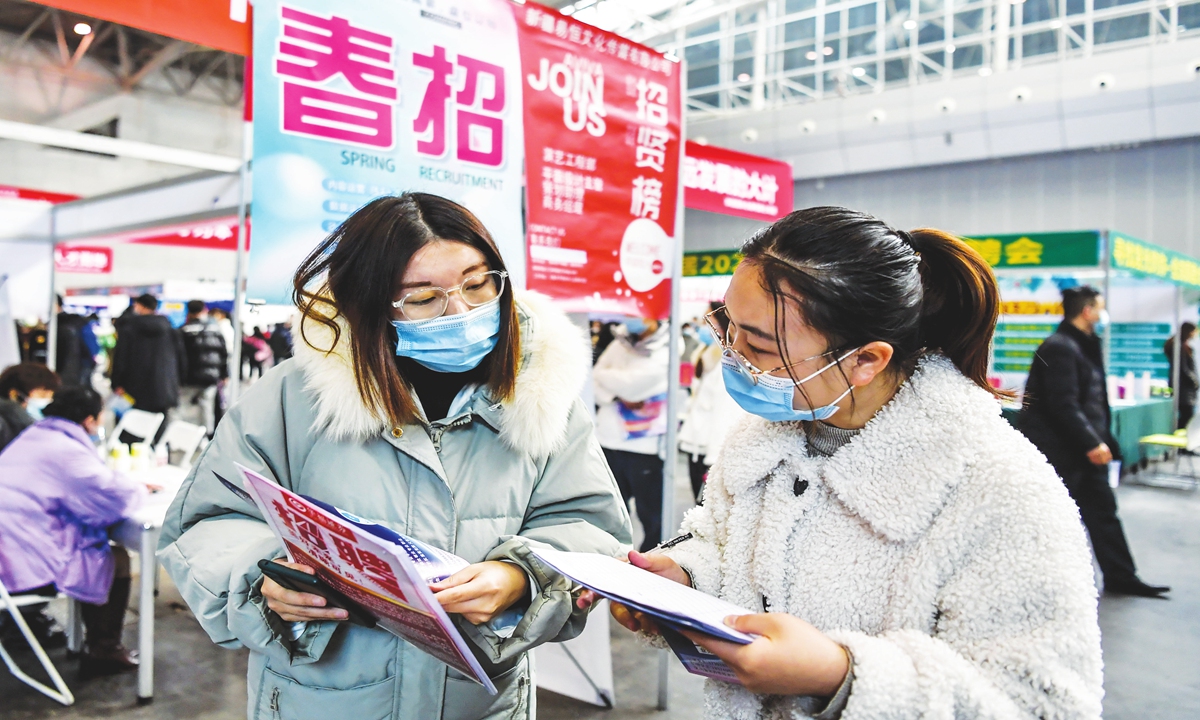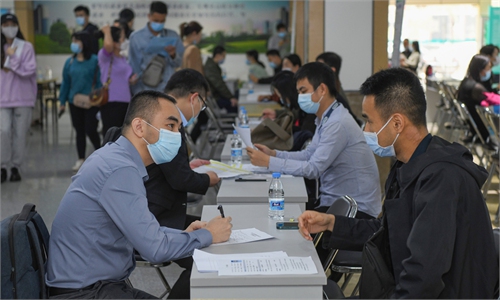Chinese workers face a tough job market, but more policy support underway
More policy support to help ease growing employment pressure

A job applicant exchanges information with a recruiter at a spring job fair held in Urumqi, Northwest China's Xinjiang Uygur Autonomous Region on Feburary 26, 2022. The fair hosted more than 200 enterprises with 2,000 positions available. Photo: cnsphoto
A white-collar worker surnamed Wang, who graduated from university last year, had secured a job at a real estate company through campus recruitment programs. But after spending half a year rotating between various positions at the firm, she was told that her original position was no longer available.
"All I can say is that I have encountered a tough time and a tough environment," Wang said, adding that she has now rejoined tens of thousands of job seekers applying for jobs at the traditionally peak hiring season of March and April.
With the annual spring recruitment season officially kicking off, job seekers have been actively handing out their resumes and applying for new opportunities. But what they face is a tough and complicated job market, where certain sectors like the tech industry are reportedly laying off workers, while others like banks are expanding recruitment.
Growing concerns
On Monday morning, the hash tag "Alibaba layoffs" and "Tencent layoffs" began trending on Sina Weibo, as Chinese social media users expressed concerns over the uncertain domestic job market amid the latest COVID-19 resurgence in many places.
New recruitment in the first month after the Spring Festival holidays in 2022 rose slightly year-on-year, with the number of job openings growing by 1.1 percent compared with the same period in 2021, according to a report sent to the Global Times on Monday by zhaopin.com, one of China's biggest online job-hunting platforms.
Enterprises of different sizes have responded in various ways to the impact of the COVID-19 epidemic, rising energy and raw material prices, and downward economic pressure, which reflected on their recruitment plans. While recruitment demand for large enterprises has maintained strong growth, small and medium-sized enterprises (SMEs) are generally cutting back.
Industry insiders noted that the number of open positions might decline with the shifts in some industries such as private tutoring, real estate, tourism, and the internet industry affected by ongoing COVID-19 outbreaks as well as regulations.
In the real estate sector, for example, the number of jobs in the first month after the Spring Festival holidays declined 30.3 percent on a yearly basis, despite a more favorable regulatory environment, according to zhaopin.com's report.
The tourism and education sectors are also seeing declining demand for new recruits. Recruitment demand for the education sector fell nearly 50 percent compared with the first month after the Spring Festival in 2021, while the number of openings in the tourism industry dropped 29.5 percent year-on-year, data showed.
Also, internet firms have been limiting the number of opening positions, including well-funded companies that have not gone public, Zhang Yi, CEO of iiMedia Research Institute, told the Global Times on Monday.
Adding to the pressure on the job market is a record high number of college graduates in 2022, which is expected to reach 11 million, surpassing the 10 million mark for the first time.
Policy support
Ensuring a stable employment situation has become a top priority for Chinese policymakers for the year, as they are well aware of the growing pressure on the job market. The recently released annual government work report specifically stressed that the country will fully implement all measures to stabilize employment.
The report also listed various targets, including creating more than 11 million urban jobs in 2022 and keeping the urban surveyed unemployment rate below 5.5 percent. Fiscal, tax and financial policies will prioritize around job creation and support will be increased for enterprises to create more jobs, the report said.
In addition to increasing policy support, there are also various positive signs in the job market that help ease the growing pressure.
State-owned enterprises (SOEs), particularly banks, have been expanding their recruitment in a bid to mitigate the impact of the epidemic on the overall job market, financial news outlet stcn.com reported on Monday, citing an industry insider.
Multiple domestic banks have released their recruitment plans to the public with an emphasis on attracting finance and science talents. For instance, China Minsheng Bank is aiming to recruit 3,660 extra staff during this year's hiring season, while Bank of Ningbo planning to make 3,000 positions available.
A bank manager based in Southwest China's Chongqing Municipality surnamed Yu told the Global Times on Monday that banks are looking for extra employees due to the high turnover rate, adding that banks now prefer to hire more experienced applicants rather than fresh graduates, but that quotas for graduates remain stable.
Other SOEs with positions in the civil service are also popular choices among job applicants given uncertainties created by the epidemic.
Zhang said that SOEs will continue to be a popular choice for job applicants. China's robust trade sector will also offer more job opportunities, he noted, stressing that there are also great potential in industries such as smart manufacturing.
Despite reported downsizes, the internet industry also remains a favorable choice for many job seekers at the moment. For instance, 15.4 percent of talent in the business services industry expect to shift to the information technology and internet industries, according to zhaopin.com.

